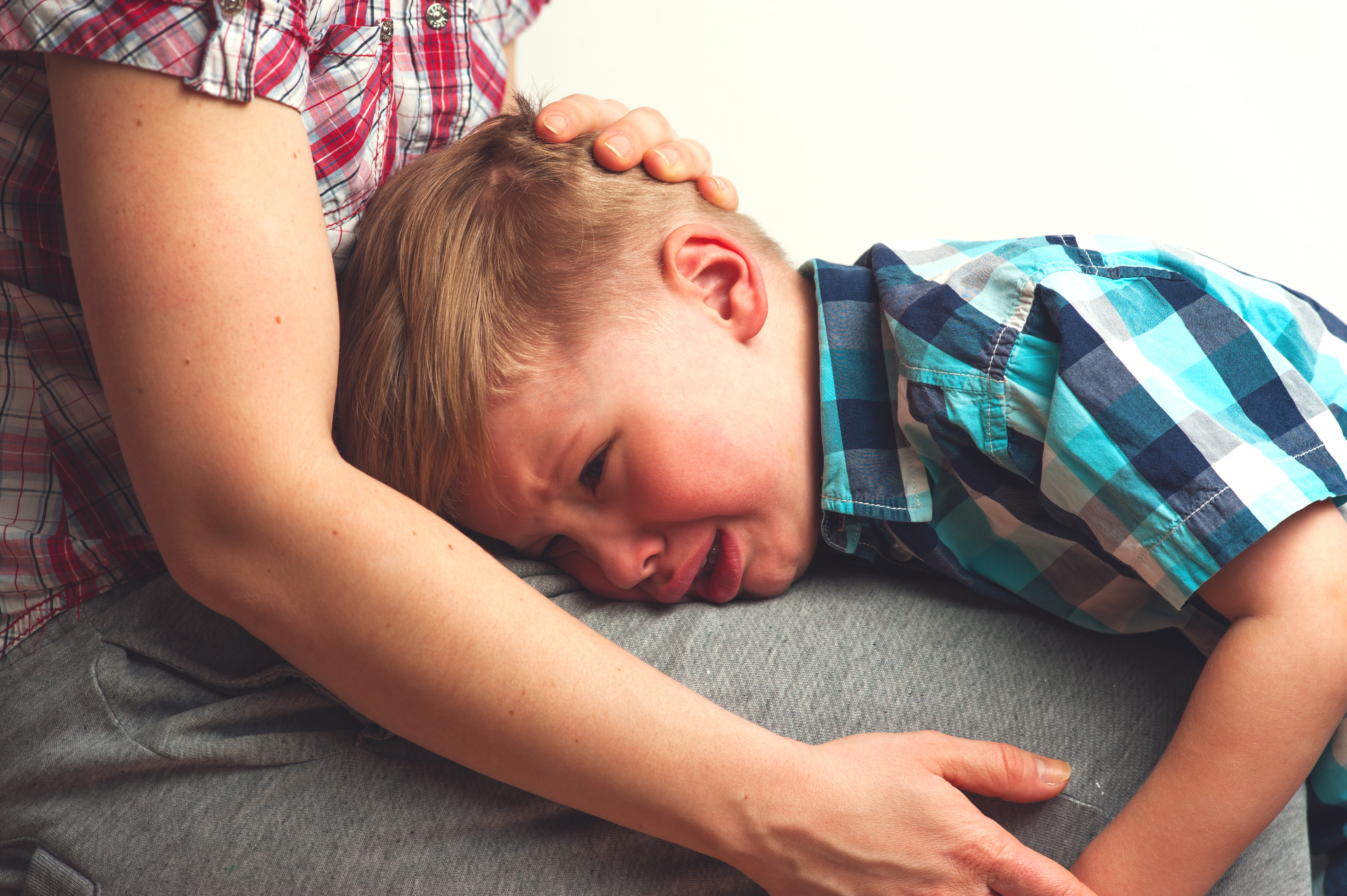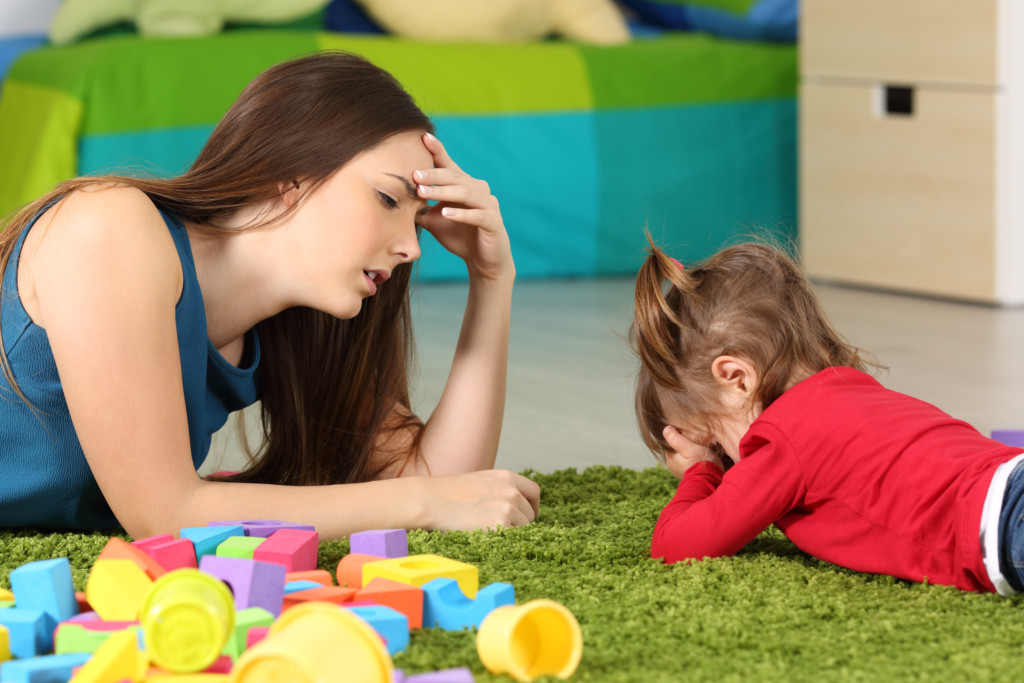 By Genevieve Simperingham. First published in The Natural Parent Magazine.
By Genevieve Simperingham. First published in The Natural Parent Magazine.
In my parent coaching work, I like to talk about anger and rage and how common the tendency to explode (or implode!) really is in families. Anger is a very real and daily challenge for most parents as they juggle the various wants and needs in the family; their child’s anger, their partner’s anger, their own anger.
Anger is an emotion that’s especially difficult to bear; it can feel scary and larger than life. It can be hard to admit to feeling angry, even to ourselves, and hard to feel that we deserve support and empathy – but we always do. Much hurt, harm and damage happens as a result of pent up or mis-directed anger, yet the emotion itself is not to blame. In fact empathy for ourselves and empathy for our child is one of the antidotes to aggression and overwhelm.
Parents get angry when …
When they feel confused about how to best respond to difficult behaviours like aggression in the family. They need the skills. Anger can rise with speed and fury when unresolved emotion or trauma becomes activated. Healing is needed. Parents get angry when the emotional, physical and financial needs outweigh the resources and they feel unsupported by family and community. It really does take a village. Overall, anger usually signifies an overwhelming backlog of unmet needs.
How quickly conflicts spark and escalate.
On any particularly busy day, parents can feel stressed and stretched by the demands of endless jobs and tight time constraints, stress rises as the pressures mount. Then if you turn and ask your child to do a couple of simple tasks like washing teeth, getting dressed, but they either ignore you or flat out refuse, that tide of anger can rise up. Your child’s refusal seems completely unreasonable! Despite trying to control your tone, you snap, your child snaps back. Boom! Conflict escalates! You can’t help wishing your child understood how minimal your demands are compared to when you were their age!
Breaking the cycles of ‘stress-passing’ in the family.
We can, and need to, learn constructive communication, conflict resolution and problem solving skills. Yet we need the patience, clarity and confidence to put them into practice. Becoming mindful of our emotional triggers that relate back to our childhood and then owning, exploring and resolving these emotions forms the foundation of peaceful parenting.
The stress response.
When we become triggered, something in the present reminds us at an unconscious level of something in the past that’s still unresolved and held as tension in the body. In reaction to our child, all of a sudden stress soars, anger rises, muscles tighten, we fixate on problems, become inflexible, and lose our ability to empathize. Without realizing it we’re caught in the fight/flight/freeze stress response and there’s no time to sit and listen when things feel this urgent. In these moments we act more from a hurt child place than a conscious adult place.
In the traditional parenting model,
parents attempt to regain control by overpowering their child with that look, by threatening punishments, withdrawing privileges, yelling and ultimatums. But parents who are working hard to not yell or coerce often face strong surges of emotion that need containing to avoid spilling their stress over onto their child. Stopping in our tracks and owning and managing our feelings takes a LOT more skill than simply threatening kids into compliance. It’s in the most challenging moments when pressures are sky high that parents face the need to skillfully surf the tides of emotions that threaten to swamp them.
Getting back on track.
When committed to more peaceful and respectful communication, we need to view our yelling and exploding as our cue to self-regulate; to come back to feeling like we can, not just escape acting from a powerless hurt child state, but become firmly grounded in our calm, confident adult self. Perhaps we need some non-judgmental listening, meditation, relaxation, we need to reconnect with our self and reconnect with our child. We just know that things are not going to get back on track with our child until we slow down and release the pressure from us both. But how do we do that?
Mindfulness.
Becoming more mindful of our triggers plays a big part in parenting from the heart with more connection and patience. It can be valuable to take time to reflect on the things that your child does that can really trigger/activate some big feelings in you and explore what’s familiar about these situations? For instance, if your child ignoring you is a trigger, does it evoke familiar feelings from your childhood years? When triggered, words can pour out of our mouths that shock us to hear, often the same words that hurt so much as a child. It’s a kind of unconscious re-enactment. The more conscious we become of our triggers, the more we can mobilize and resolve these packages of pain inside and begin to bring conscious awareness to the process as it’s happening, or about to happen and change direction. I developed my Stress Relief for Parents CD with this whole subject in mind. The tracks equip the listener with exercises to help them resolve difficult feelings, gain insights into what unresolved emotions are being triggered and offers a blissful 15 minute body relaxation.
It’s okay not to feel okay.
When our child’s behaviour triggers a highly emotional response, by increasing our mindfulness of our reactions, we gain an opportunity to bring compassion to some sore feelings that need and deserve attention. There’s a lot of power in observing the sensations in our body and recognising the feelings that get activated at these times and where those feelings are held within the body. We may identify feelings of sadness, overwhelm, perhaps fears or feelings of inadequacy. The trigger might be your child’s resistance, lack of responsiveness, their lack of affection, their affection for their other parent, aggression, tantrums, neediness, their response to sleep, food, chores, school. Something is experienced as familiar at a body instinctive level, feelings open in your body memory that your conscious mind was previously unaware of.
Start working through one of our Peaceful Parenting eCourses today.
They each focus on different aspects of peaceful parenting including not-least peaceful self-parenting.
They’ve been designed to reduce overwhelm and make it easier to learn and implement the PP strategies that transform families.
When we’re triggered
It can feel as if the hurt inner child is competing with our child’s feelings with sentiments of; “nobody cares about MY needs/ resentments/ frustrations/ disappointments/ grief”. Such inner conflict can be very uncomfortable, but be assured that if you’ve even started to become aware of such internal reactions, you’re well on the road to breaking the cycles of disconnection and well on the road to claiming more peace of mind and heart for yourself and your child.
Listening heals.
Counselling and psychotherapy can be a great way to explore and resolve stuck feelings and patterns from the past that prevent growth in the present. Counselling or organized listening partnerships differ from chatting with friends in that it gives you the chance to really drop into exploring where the related feelings are held in the body. Crying can feel so very cleansing and relieving when the space is held by a calm, patient, wise and empathic listener. Their acceptance of your feelings helps you listen to yourself to glean the deeper insights and resolve feelings that previously felt so unmovable like the big rage and grief that can compromise your clarity and confidence daily.
Taking the pressure off.
Parents carry so much stress and fear around getting to sleep, school, work, daycare or swimming lessons on time. Children don’t and can’t function well within a busy time pressured timetable. In aiming to lower the stress levels in the family, parents often realize that everyone is living under more pressure than they can sustain and it calls for a re-evaluation of their lifestyle. It’s good to talk about downtime and de-stressing, to model taking rests, reading, playing, meditating, support your kids to have free play time, time to daydream, time in nature, time to find and follow their interests.
Self-regulation skills.
As well as therapy, there are many self-regulation and self-healing skills that everyone can learn that really help to restore peace and calm when strong emotions threaten to dominate the scene. I’ll share with you some of the tools that work for me and for many parents that I help:
Reconnecting with your heart.
This simple act of putting your hand on your heart and asking; “what am I feeling, what do I need?” helps us reconnect with our inner world in a positive way. The response might be “I feel stressed! I feel angry! I need to slow down, I need to ask for help, I need to cross something off today’s list of activities.” Try it!
“Name it to tame it”
This is a phrase coined by author and psychiatrist Dr Daniel Siegel. There’s a lot of power in simply naming what we’re feeling. When we tell our child “you’re making me so angry”, we give them the message that they control how we feel and it’s their responsibility to keep us happy. Whereas, when we say “I feel angry, I really need to slow down and relax”, we show them that we can not only identify and be honest about how we feel but also take responsibility and relieve them of responsibility for our feelings. This really is fantastic modelling for our children. The child who can clearly express that they’re angry is more likely to seek support and less likely to take their anger out on others. I love how, in response to enquiring “you seem really stressed, what do you need?” my children often reply with simple expressions like “I’m angry”, “I feel overwhelmed”, “everything feels really hard at the moment”, “I feel like I need to scream”. When such feelings are expressed, accepted and understood, the emotional charge can dissipate significantly.
Positive self-talk.
We tend to respond to our emotions with similar words and messages that our parents responded to our emotions. Becoming mindful of our self-talk and consciously practising empathic and supportive messages, we begin to re-parent ourselves. Being kind to ourselves creates the foundation for kindness to others. For example, instead of berating yourself for feeling angry and overwhelmed, you might say to yourself “it’s ok, this is just a tough moment, it’s okay to feel what I’m feeling”.
Simply sitting.
There’s a Chinese proverb that says “If you are patient in one moment of anger, you will escape a hundred days of sorrow.” Even though anger can give us physical superpowers, attacking the housework in a manic passive aggressive frenzy can be pretty scary and overwhelming for our kids and isn’t the best modelling! When we become overly stressed, our system becomes flooded with stress hormones, everything speeds up, our breathing, our thinking becomes irrational, our tone of voice intensifies and we speak faster, which every child knows to be a warning sign! Simply sitting down in an armchair or even lying on the ground or the grass slows everything down, totally changes the dynamic with our child and gives us a chance to emotionally re-stabilize. This modelling teaches our children what they can do in overwhelm.
Visualising a red stop sign.
To help you hold back from speaking words or taking action that you’ll later regret and need to repair with your child, if you just remember one thing, remember a red stop sign. When feeling emotionally charged, it’s hard to remember the theory, but the brain responds very well to visual messages and bringing to mind a red stop sign, or even better creating or printing a drawing to put up on the wall, may help you stop and slow down enough to begin to remember some more positive things you can do. If you draw or print one, you could write some key reminder words on it like; “breathe”, “centre”, “de-stress”.
Fresh air brings a fresh perspective.
When stresses rise in the family, the walls can start to close in, everywhere we look jobs demand our attention. Being in nature helps us decompress and relax. The sights, sounds and smells of nature remind us of life’s small pleasures and help to put things back in perspective. Most people can literally feel the stress starting to drain away when they put their bare feet on the earth. Looking up at the sky, looking out to nature helps us lift up and out of the scenario that we’ve got ourselves tightly wound into.
I can see clearly now …
Once we return to a calm state, many options open up. We again remember our child’s goodness and can reconnect and repair after conflicts. Our child feels and experiences our emotional storms and instinctively protects themselves by muffling the communication. Yet when a parent restores calm inviting communication, their child’s usually right there waiting for them, power struggles dissipate and warmth, connection, cooperation and humour return to the scene.
Written by Genevieve Simperingham, founder of the Peaceful Parent Institute in New Zealand, parent coach, educator and psychosynthesis counsellor.
Other resources that may be helpful:
I also recommend working through our Overcoming Overwhelm Course which has been created especially to help parents work through becoming more mindful of and better managing their frustrations, anxiety and anger. Parents often describe how the information comes to life for them when they work through this course. It brings in many of these same principals in this article, but takes you through a step by step process to develop your daily self-care practice, to explore your triggers with on screen reflection questions and then some videos that guide you through some simple but powerful ways to reduce the intensity of unresolved painful emotions that were previously locked in the nervous system, ready to flare up in moments of high pressure.
Genevieve’s Stress Relief for Parents (featured in the right side bar) has been developed to help parents reduce their stress levels and learn and practice emotional self-regulation skills, as well as having a guided relaxation that is effective not just for adults but in helping children settle at night.
Click here to Subscribe to receive other articles and updates.
Find us on FACEBOOK









What a great article. So validating and helpful. Thank you so much.
PS I think you mean antidote instead of anecdote at end of first paragraph.
Thank you!
So clear and thorough, and as gentle and generous as always.
Blessings,
Stacy
I am really thankful to the owner of this site who has shared this wonderful post at at this place.
Oh, man, this is fantastic. Thank you.
hello Tracy loved your creative comment i’m a mother myself and my son is going through depression and i cant stop crying thank you for letting me know this website was good i read this to my son he stared to flowing these steps. and just like that his depression went away hes happy and more active and his grades are getting better each day this article made me have a son i love him so much thanks
Great article!
Thank You
Thank You for this excellent post
Great article!
Greetings! Very helful advice within this post!
It’s the little changes wwhich will make the largest changes.
Many thanks for sharing!
Thank you for writing and sharing this. It is helpful for all relationships, but especially as an aid for my parenting skills. Thoughtful and well-written as always.
I have exploded ever since I was a kid. My dad said I reminded him of himself when he was a kid. He exploded throughout my childhood. As an adult, I went to counseling for 2 years to help. I married an even keeled wife and thought I was healed and over it. I hadn’t exploded for over 10 years. Until my second son turned out exactly like me. My explosions are back.
Thank you so much for this website and insight. I need all the help I can so I don’t explode, and can teach/model for my son. I am so glad I found this after another Sunday filled with explosions.
Brian I’m so pleased that this information has been helpful and supportive for you. Gaining more insight into what might be happening for us and for our child is half the battle. There are SO many articles on this website that will help you so much, just keep reading and inch by inch I’m sure you’ll gain more tools for yourself and for your son. Empathy for yourself and empathy for him around just how very painful and difficult this is supports you to make the necessary changes. As an adult you’re learning to lower your stress levels and get better at identifying and managing the frustrations on a day to day basis. Also look at my articles relating to mindfulness. And maybe look at doing some of the eCourses which would guide you through making the necessary changes.
[…] Also read; Why we explode and how to prevent it. […]
hello Tracy loved your creative comment i’m a mother myself and my son is going through depression and i cant stop crying thank you for letting me know this website was good i read this to my son he stared to flowing these steps. and just like that his depression went away hes happy and more active and his grades are getting better each day this article made me have a son i love him so much thanks
[…] If you're committed to doing less yelling and better managing your stress, there are so many resources and direct support through the forums from Genevieve, our PP mentors and other parents in our Peaceful Parent Membership Village. There's a self-healing group, videos, audios and eCourses like Mama Meltodown and the 10 Day Peaceful Parent Challenge. Also, you can read "Why we explode and how to prevent it" […]
[…] You might like to also read: Why children lash out and how to prevent it and for parental anger Why we explode and how to prevent it. […]
Thank you for this great article. So much of the anger comes from holding on to expectations – having wants, as the Buddhist would tell you. Letting go of those expectations or at least recognising them as your own expectations and not those of the child, can really help. Especially when dealing with our autistic son. A great read – thanks
So glad this was helpful Duncan. And yes so true about better managing expectations being so key!
[…] not all, days. There are so many unmet needs to grapple with all the time. We can feel exhausted, irritated, frustrated, angry, confused, worried, guilty, anxious, lonely, misunderstood, exasperated, overwhelmed or just low. […]
[…] You might also like to read: Getting back on track – why we explode and how to prevent it. […]
[…] child demands they go to the shop for a treat. The debate is raging when the parent realises their stress is through the roof. They remember they actually need to slow down and get […]
[…] at how much more criticism they now attract compared to back when they used time-out, threats and liberally yelled at their […]
[…] to truly owning the anger and triggers that your strong-willed child evokes in you. Model humility, repair conflicts well and restore your […]